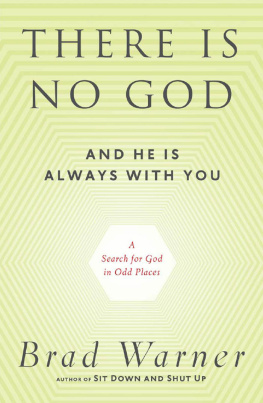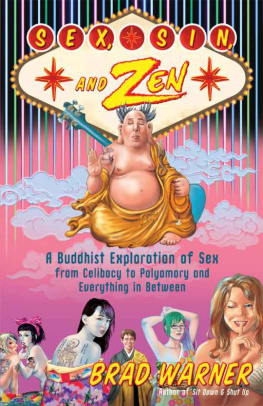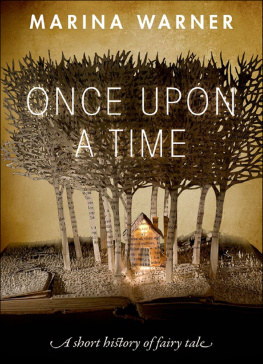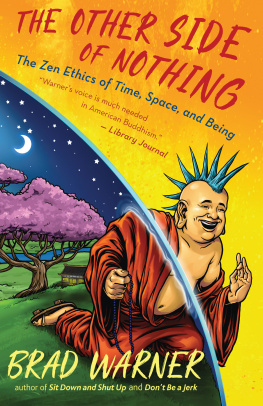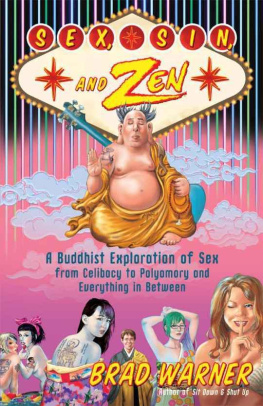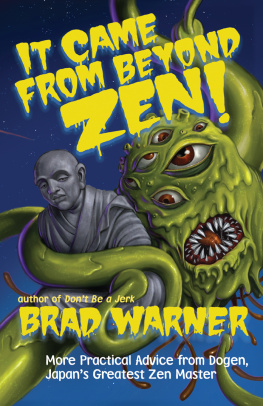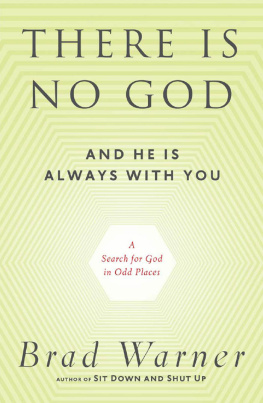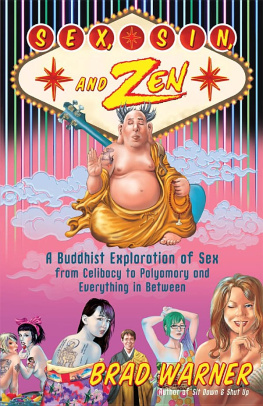
ALSO BY BRAD WARNER
Hardcore Zen
Sex, Sin, and Zen
Sit Down and Shut Up
Zen Wrapped in Karma Dipped in Chocolate



Copyright 2013 by Brad Warner
All rights reserved. This book may not be reproduced in whole or in part, stored in a retrieval system, or transmitted in any form or by any means electronic, mechanical, or other without written permission from the publisher, except by a reviewer, who may quote brief passages in a review.
Text design by Tona Pearce Myers
Library of Congress Cataloging-in-Publication Data is available.
First printing, June 2013
ISBN 978-1-60868-183-9
Printed in Canada on 100% postconsumer-waste recycled paper
 | New World Library is proud to be a Gold Certified Environmentally Responsible Publisher. Publisher certification awarded by Green Press Initiative. www.greenpressinitiative.org |
10 9 8 7 6 5 4 3 2 1
CONTENTS
T he word God means different things to different people. I wrote this book to explain what God means to me. A lot of people expect that as a Zen Buddhist monk and teacher, I must not believe in God. Theyve read that Buddhism is a godless religion. And some folks are frightened by this idea. But many, especially the people I meet in my capacity as a Buddhist teacher, are elated by it. They love the idea that they can have a religion without a God.
But in my opinion its entirely wrong to say that Buddhism is a religion without a God. In fact, its quite the opposite. To me Buddhism is a way to approach and understand God without dealing with religion.
Right here, at the very beginning of this book, I want to be clear about my position. Alan Watts, author of a number of books about Zen, once said in a lecture,
I am not a Zen Buddhist; Im not advocating Zen Buddhism; Im not trying to convert anyone to it. I have nothing to sell: Im an entertainer. That is to say in the same sense that when you go to a concert, and you listen to someone play Mozart, he has nothing to sell except the sound of the music. He doesnt want to convert you to anything, he doesnt want you to join an organization in favor of Mozarts music as opposed to, say, Beethovens. And I approach you in the same spirit: as a musician with his piano or violinist with his violin, I just want you to enjoy a point of view which I enjoy.
This is pretty much how I feel. Only I did something that Alan Watts was clever enough not to do. I got ordained a Zen Buddhist monk. What can I say? It seemed like a good idea at the time. And the system needs someone on the inside to irritate it a little bit.
I couldnt care less if you decide to become a Zen Buddhist as a result of reading this book. In fact, I hope you dont. That being said, though, the philosophy and practice associated with Zen Buddhism have been tremendously useful to me; otherwise Id never have become a monk. I think it might be useful to you too.
But categorizing oneself as a Zen Buddhist is absolutely contrary to the spirit of Zen Buddhism. And the organizations claiming to uphold the spirit of Zen Buddhism can be just as silly, hypocritical, and corrupt as any religious institution. Still, unlike Alan, I feel I have little choice but to call myself a Zen Buddhist. Ill address this topic in detail later. But for now I want to concentrate on why I, as a Zen Buddhist, believe in God.
By the way, in this book I will occasionally use the words Zen and Buddhism somewhat interchangeably. This drives some people bananas. Zen Buddhists often quite arrogantly insist that theirs is the only real kind of Buddhism, while Buddhists of other types just as often insist that its not. But Zen is just the Japanese pronunciation of the Sanskrit word dhyana, which means meditation. So to me Zen Buddhism means Buddhism that involves meditation. Since meditation is the main thing that the historical Buddha taught, I think its fair to say that anything that calls itself Buddhism and doesnt involve some kind of meditation may not really be Buddhism. So in using the phrase Zen Buddhism Im referring not necessarily to that particular sect and lineage labeled by historians as Zen Buddhism but to all forms of Buddhism that focus on meditation practice, or zazen.
There are many possible answers to the question of whether its possible to be a Buddhist Zen or otherwise and also believe in God. One answer could be that it depends on what you mean by God. Another could be that it depends on what you mean by Buddhist. A third could be that it depends on what you mean by believe. When framing such questions we often take for granted that all parties use the same definitions of the words we choose. But thats not always the case.
I was not raised in a religious family. Oh, I suppose we were nominally Protestant. My dad has a photo that shows me with a group of kids at a local Sunday school. But I couldnt have attended very often since I have no memory of ever having gone at all. I first started getting interested in God when I was about ten years old and the movie Jesus Christ Superstar was all the rage.
We were living in Nairobi, Kenya, where my dad worked for the local branch of the Firestone Tire and Rubber Company. Hed been sent there from the home office in Akron, Ohio. I grew up in an Akron suburb until I was about eight and then spent almost four years in Africa. In Africa I made friends with Tommy Kashangaki, whose mother was an American Jewish woman and whose father was Tanzanian. The Kashangakis were raised Catholic. They knew about God. So I used to ask Tommy and his older brother, James, a lot of questions.
What I couldnt get from Tommy, James, or the copy of the Jesus Christ Superstar sound track I got for Christmas one year, I learned by reading the childrens Bible my mom got us. The whole idea of God was just so weird and fascinating. Some people were sure he existed. Others were certain he did not. Many, like my parents, didnt know either way.
When I thought about God back then I used to imagine him not as a giant white man on a throne in the clouds. I knew even at that age that this was just a metaphorical representation, although Im sure I couldnt have explained it in those words. Instead I envisioned God as sort of a big, round, shiny entity of some sort. Sort of like the sun but with a personality.
As I grew older, my fascination with God continued. But I became increasingly disgusted with those who claimed to speak for him. We moved back to Ohio when I was eleven, and I soon discovered the amazing world of television evangelism. The idea that there were TV stations entirely devoted to God was pretty intriguing. But it didnt take long for me to figure out that the people who ran these TV stations were as clueless about the real nature of God as anyone else. They were just clever at manipulating peoples fears and desires and using God as a way of getting scared and greedy people to send them money.
In high school I discovered books published by the International Society for Krishna Consciousness at a used bookstore called the Book Nook in downtown Wadsworth, Ohio, where I lived. Those Hare Krishna guys also said they knew what God was like. But their version of God was different, at least superficially. God, they said, had a name, which was Krishna, and he had a specific form. He was a handsome purple-skinned Indian youth who could have sex with a thousand girls at a time. The God they talked about at the local Baptist church couldnt do that!
Next page
